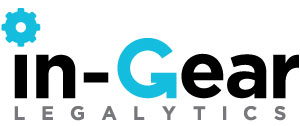
Where others see revolution, I see evolution
By Bill Novomisle, In-Gear Legalytics
The new year of 2018 has started off with a bang for reporters covering the topic of innovation and change in the legal profession. Big announcements have come from Deloitte, PwC, and UnitedLex. In addition, a lot of focus has been on the steady progression of artificial intelligence applications in law, including some validation of my earlier predictions. However, legal technology will be the focus of a forthcoming article. Rather, the growth of non-law firms in the no-longer exclusive domain of corporate legal services is the topic that is my current preoccupation, specifically whether what we are seeing is actually innovation or is it just reshuffling the deck chairs on the sinking Titanic of “old law”?
First, let’s consider the three big pieces of news that have come out at the end of 2017 and the start of 2018. First up, the Swiss arm of PricewaterhouseCoopers has started selling automated contracts with PartnerVine. Then PwC Switzerland continued to make a big splash with the addition of Marc Morant from Axiom to launch their new flexible lawyer staffing solution, Flexible Legal Resources. Second, Deloitte has filed for an ABS license to enter the UK legal services market, making the entry of the Big 4 into the UK complete. Last and not least, UnitedLex’s announcement in December 2017 that they will take over contract management and immigration legal work from DXC Technology Co. by taking on over 200 of DXC’s in-house lawyers as new UnitedLex employees. Is this a three-pronged assault, occurring all over the globe against the entrenched hegemony of corporate lawyers and the way they do business? Or is this something else entirely? Spoiler alert: my view is that this is not as revolutionary as some commenters would have you believe. But it is powerful evidence that evolution in the legal profession is continuing along the same trend it has followed for the last several years, and the pace may be accelerating.
Let’s start with a deeper dive into what is actually happening in each case.
- How will PwC shake up the Swiss legal market?
- How will Deloitte shake up the legal market in the UK?
- How will UnitedLex’s DXC deal alter the legal landscape?
Nearly all of the DXC work going to UnitedLex was performed in-house previously (over 90%) and cost savings of 30% are predicted to be realized through a combination of process improvement and technology support.
Or in a nutshell, all three innovations rely on a combination of people, process and technology to improve legal services at lower cost. But do these announcements herald innovation or are they steps along the path legal services have been progressing along for years?
On the people side, the overall markets that all three of these developments play within remain unaffected by this news. There is no evidence that PwC will add a supply of additional lawyers to the market. Rather, every indication is that it will pull lawyers from existing law firms and in-house departments or established alternative service providers such as Axiom. If a law firm were to both lose lawyers as well as work to PwC, it will see its top-line revenue shrink but should not experience massive disruptions to its overall profitability. While the impact on an individual law firm may very well be significant, overall in the market this doesn’t seem to be much more than reshuffling of talent and revenues, with the overall market sailing along stably. The situation with Deloitte is no different: same people, same amount of work, different business cards. UnitedLex is even more explicitly neutral on the people portion – the employees that UnitedLex will be using for the DXC mandate are former DXC employees.
Process poses a bit more of an interesting question. All three announcements make allusions to improving processes in order to achieve cost savings. As an advisor and consultant to law firms and corporate legal departments, I firmly believe that process improvement can and does absolutely make a difference in terms of both efficiency and efficacy in the delivery of corporate legal services. However, legal process management has been around for many, many, years now and questions regarding LPM have worked their way into nearly every global RFP or panel counsel questionnaire I have seen over the last seven years. At this point, just about every law firm has an answer for what they have done to invest in LPM. However, few have truly embraced a new way of working that is grounded on LPM principles on a firm wide-basis.
Thus, the challenge and opportunity for all three players is whether their process management and engineering is lip-service, or part of their core value differentiator. PwC answered this challenge by taking lateral talent in the form of Marc Morant and his team from Axiom, where process engineering is part of their DNA, and thus the team is already well versed in process engineering as both theory and practice. UnitedLex claims that it has invested in developing process improvements, and indeed announced that it had invested five years into developing process improvements. But this is their first major deal and time will reveal whether (1) their process engineering is good enough to deliver the predicted savings and (2) whether their process engineering approach is novel and market leading, market average, or falls short of expectations. Deloitte is an open question and may choose to develop their own proprietary processes or may choose to bring on established talent, which we will see after their license is approved and they start practicing. However, the key here is that no one – yet – has actually innovated in the space of process engineering. So far, the only thing we can say with confidence is that they have taken established process improvement methodologies and applied them to established use cases that haven’t gotten the re-engineering treatment yet. (More on this in a bit).
Finally, that leaves technology. Deloitte makes a vague allusion to “technology” in its announcement as how it will be able to provide lower-cost yet highly effective legal services. Historically, on the legal side, Deloitte has primarily been content to partner with established legal tech players (e.g. Kira) to incorporate technology. However, Deloitte’s tax practice has historically produced significant proprietary software solutions for its clients, and it is possible that Deloitte Legal will follow an analogous path. PwC has followed a similar path in the past, and its partnership with PartnerVine seems to confirm that they are not quite ready to take the leap into becoming a software company. UnitedLex is the outlier among these three – it has spent eight years developing a contract management platform. The world outside of UnitedLex hasn’t gotten to see much of this new platform, and thus it is impossible to comment on how this technology compares to the existing state of the art.
Which is a critical point. The types of technology that these companies are all looking at all involve contracts and contract management. This is hardly untouched territory. The number of contract management solutions out there are impressive and seemingly grow every quarter. From the massive, and business-oriented (Salesforce.com) to the (new) law entrants focused on legal departments (Axiom, Selectica, Elevate/Seal, Epiq, ShakeUp), to long established players in the contract/DMS space (Agiloft, Updraft, Onit, and many more), the ability to use technology to improve the contracting process at corporations is established and the competition is high. Even the meaning of contract management has been expanding from negotiation and automation into new AI-driven business and risk management tools (e.g. AxiomAI)
So once again, where is the innovation (aside from yet another proprietary product in an established space)? Consider the perspective of the buyer of these services: e.g. a medium to large corporate legal department looking at a burdensome amount of contract work and a constricting budget. This is a challenge for which there are well established answers that are on-point for their use case. They have the following options:
- Improve internal efficiency via one or more of the following initiatives:
- Process reengineering lead by an external expert
- Process reengineering lead by an internal expert
- Buying and implementing a technology solution
- Outsourcing this work to a third party solution
- Where the third party provides its own people, process and technology (Axiom, Elevate)
- Where the third party takes over the employment of your people and adds its own process and technology (UnitedLex)
In this way, 2018 looks a lot like 2017 (and 2016, and 2015, etc.). To the extent that there is something new on the market, it is the option of selling off your internal employees to an external provider, which UnitedLex seems to be trailblazing. Which also seems to be the next natural step in the evolution of the legal employment disruption that occurred post-2008 and which gave birth to Axiom. If the ability to offload employees proves with time to be an attractive value differentiator for clients, it seems like established alternative providers such as Axiom and Elevate would be well positioned to move quickly into this space.
What about law firms? The good news is that these developments do not pose any particularly new threats from the view of at least this author. However, they do underscore that the threats that have been discussed for years are real and encroaching. In other words, the bad news is that if you were hoping you could avoid change the answer is emphatically “no.” The cost pressures clients are facing remain unrelenting, even as we approach the decade anniversary of the MBS crash. The appetite for legal services delivered from a mindset of efficiency is only growing. The need to know your firm’s true value proposition – what you do that no one else does better – as well as how to truly drive profitability (not merely measure utilization) is critical. The firms that have both the clarity of vision, as well as the proper management tools to drive that strategic vision, will be the big winners. The rest risk becoming victims to evolution.
